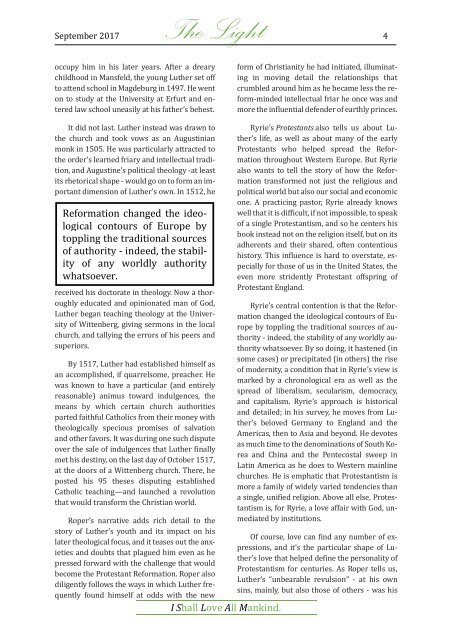2017 09 The Light September 2017
Organ of the worldwide Lahore Ahmadiyya Movement. We believe that the Holy Prophet (s) was the last prophet after whom no prophet, old or new shall come and that all those who recite the kalima are Muslims. We believe that Is a liberal, tolerant, inclusive, peaceful, rational and scientific religion.
Organ of the worldwide Lahore Ahmadiyya Movement. We believe that the Holy Prophet (s) was the last prophet after whom no prophet, old or new shall come and that all those who recite the kalima are Muslims. We believe that Is a liberal, tolerant, inclusive, peaceful, rational and scientific religion.
Create successful ePaper yourself
Turn your PDF publications into a flip-book with our unique Google optimized e-Paper software.
<strong>September</strong> <strong>2017</strong> <strong>The</strong><br />
<strong>Light</strong> 4<br />
occupy him in his later years. After a dreary<br />
childhood in Mansfeld, the young Luther set off<br />
to attend school in Magdeburg in 1497. He went<br />
on to study at the University at Erfurt and entered<br />
law school uneasily at his father’s behest.<br />
form of Christianity he had initiated, illuminating<br />
in moving detail the relationships that<br />
crumbled around him as he became less the reform-minded<br />
intellectual friar he once was and<br />
more the influential defender of earthly princes.<br />
It did not last. Luther instead was drawn to<br />
the church and took vows as an Augustinian<br />
monk in 1505. He was particularly attracted to<br />
the order’s learned friary and intellectual tradition,<br />
and Augustine’s political theology -at least<br />
its rhetorical shape - would go on to form an important<br />
dimension of Luther’s own. In 1512, he<br />
Reformation changed the ideological<br />
contours of Europe by<br />
toppling the traditional sources<br />
of authority - indeed, the stability<br />
of any worldly authority<br />
whatsoever.<br />
received his doctorate in theology. Now a thoroughly<br />
educated and opinionated man of God,<br />
Luther began teaching theology at the University<br />
of Wittenberg, giving sermons in the local<br />
church, and tallying the errors of his peers and<br />
superiors.<br />
By 1517, Luther had established himself as<br />
an accomplished, if quarrelsome, preacher. He<br />
was known to have a particular (and entirely<br />
reasonable) animus toward indulgences, the<br />
means by which certain church authorities<br />
parted faithful Catholics from their money with<br />
theologically specious promises of salvation<br />
and other favors. It was during one such dispute<br />
over the sale of indulgences that Luther finally<br />
met his destiny, on the last day of October 1517,<br />
at the doors of a Wittenberg church. <strong>The</strong>re, he<br />
posted his 95 theses disputing established<br />
Catholic teaching—and launched a revolution<br />
that would transform the Christian world.<br />
Roper’s narrative adds rich detail to the<br />
story of Luther’s youth and its impact on his<br />
later theological focus, and it teases out the anxieties<br />
and doubts that plagued him even as he<br />
pressed forward with the challenge that would<br />
become the Protestant Reformation. Roper also<br />
diligently follows the ways in which Luther frequently<br />
found himself at odds with the new<br />
I Shall Love All Mankind.<br />
Ryrie’s Protestants also tells us about Luther’s<br />
life, as well as about many of the early<br />
Protestants who helped spread the Reformation<br />
throughout Western Europe. But Ryrie<br />
also wants to tell the story of how the Reformation<br />
transformed not just the religious and<br />
political world but also our social and economic<br />
one. A practicing pastor, Ryrie already knows<br />
well that it is difficult, if not impossible, to speak<br />
of a single Protestantism, and so he centers his<br />
book instead not on the religion itself, but on its<br />
adherents and their shared, often contentious<br />
history. This influence is hard to overstate, especially<br />
for those of us in the United States, the<br />
even more stridently Protestant offspring of<br />
Protestant England.<br />
Ryrie’s central contention is that the Reformation<br />
changed the ideological contours of Europe<br />
by toppling the traditional sources of authority<br />
- indeed, the stability of any worldly authority<br />
whatsoever. By so doing, it hastened (in<br />
some cases) or precipitated (in others) the rise<br />
of modernity, a condition that in Ryrie’s view is<br />
marked by a chronological era as well as the<br />
spread of liberalism, secularism, democracy,<br />
and capitalism. Ryrie’s approach is historical<br />
and detailed; in his survey, he moves from Luther’s<br />
beloved Germany to England and the<br />
Americas, then to Asia and beyond. He devotes<br />
as much time to the denominations of South Korea<br />
and China and the Pentecostal sweep in<br />
Latin America as he does to Western mainline<br />
churches. He is emphatic that Protestantism is<br />
more a family of widely varied tendencies than<br />
a single, unified religion. Above all else, Protestantism<br />
is, for Ryrie, a love affair with God, unmediated<br />
by institutions.<br />
Of course, love can find any number of expressions,<br />
and it’s the particular shape of Luther’s<br />
love that helped define the personality of<br />
Protestantism for centuries. As Roper tells us,<br />
Luther’s “unbearable revulsion” - at his own<br />
sins, mainly, but also those of others - was his














